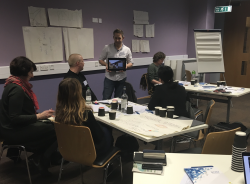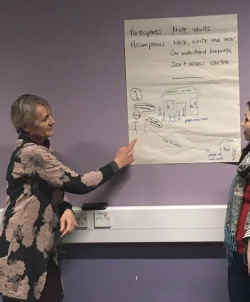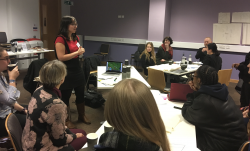Date: 19/04/2018
Naz Biggs, Beatrice Tura, and Ben Thomas are all students on the SCDTP 1+3 programme. They are using a variety of creative research methods for their MSc dissertations and PhD projects. Naz is interested in how creative methods can be used in the research process for data collection and the dissemination of research. She is particularly interested in using drawing and poetry. Beatrice would like to use photo-elicitation techniques for her dissertation which will investigate how elderly Londoners of African Caribbean descent negotiate place and memory, specifically exploring how these long-term residents experience gentrification. Ben is interested in using creative stimuli such as photography and soundscapes as elicitation techniques for his research into people’s working lives.
INTRODUCTION
In mid-March 2018, three students from the MSc in Social Research Methods took the opportunity to attend the National Centre for Research Methods (NCRM) ‘Using Creative Research Methods’ course at Queen’s University, Belfast. This inspiring day, run by independent researcher Dr Helen Kara and attended by doctoral candidates from 16 different institutions, was a fantastic opportunity to discover the exciting range of innovative methods which are being used by social science researchers in the UK today.
CREATIVE METHODS
Creative methods, by making room for improvisation and messiness, open doors for academia to travel outside of its circles and both reflect and reconnect with the social life it is concerned with. Secondly, creative methods, unlike discipline-defined ones, allow themselves to be shaped mainly by their object of study and often favour collaborative, interdisciplinary work.
These are good methods to use when researching children and young people older people, people with mental health issues, people dealing with trauma. However, creative methods can be used with all types of participants.
Creative methods do not change good practice, and do not replace well-established methods. More often than not, they are used in collaboration with other research methods and can be used at any stage within the research process (research design, data gathering, data analysis and reporting).
Although the creative methods field is growing, and new and innovative methods are being used every year, currently the field could be conceptualised as including the following:
Arts-based research
- Research using technology
- Mixed-methods research
- Transformative research frameworks
Arts-based research
Arts-based research is not just about visual arts – it can also include written, video and technological mediums. Arts-based methods could be appropriate when there are particularly sensitive or emotional topics under study. If there is something else for research participants to focus on, for example, a collage, subjects can be expressed in a different way. One of the challenges which may come up, is that the researcher employing arts-based research needs a level of confidence in their own ability. In some cases, an arts practitioner may be more appropriate. However, the costs of using this type of research may need to be considered during the research design stage.
Research using technology
The use of technology in research is widespread, as technology is able to save researchers time and money. For example, online surveys negate the more cumbersome and resource-heavy postal survey. However, the researcher needs to be competent with any technology they use, which may require training, and equipment failure and lost data are always a risk.
Mixed-methods research
Traditionally, mixed-methods research has focused on using both quantitative methods (such as surveys) with qualitative methods (e.g. interviews). But now there are various combinations of methods that can take place, including the use of a variety of quantitative methods, or a variety of qualitative methods, or combining a wide range of both. This can be particularly helpful if the researcher is dealing with really complex research questions. Multiple mixed-methods could provide richer data and more insight into research puzzles. One thing to consider is that typically mixed-methods need more resources, researcher skill and thorough planning.
Transformative research frameworks
Transformative research frameworks go beyond traditional approaches. They can be participatory and/or community based, feminist, or involve activist or emancipatory research. Transformative research provides a framework that researchers work within. Usually with this type of research, participant voices are heard and treated as equal within the research process. In some cases participants are deemed co-researchers. Researchers who choose to adopt this framework want their research to bring about positive change. Transformative research can create new ethical difficulties, therefore, requires careful thought.
TASKS
Poems
One of the tasks the attendees carried out was a reflexive exercise that used poetry to analyse an interview transcript. Attendees were encouraged to view the interview transcript and create either an i-poem (which centres around the interviewee), a randomly composed poem, or a poem that makes the interviewer the main subject. Attendees were told they could be as creative with the data as they liked. The following example is a poem generated from one of the attendees from the interview data, and reflects the flexible and fluid nature of the creative exercise. The interview was carried out with the young person and the topic discussed were attitudes towards school and classroom and feelings towards work and earning.
JUST BECAUSE I LIKE DANCING
I do think it’s unfair
but if I think about it it’s
I don’t know
It’s not really unfair but
Help … yeah.
Not picked for stuff at school and stuff
I think it’s Thursday all day
We have to buy a hair brushing kit.
Mmm.
Creative presentations
A different task was to create a research design with at least one creative method and present it back to the group. We were given a brief background outline about a community centre that was not being used by some groups in society. Community leaders wanted research conducted to find out how to make the community centre more accessible for groups that were not attending the centre. Each presentation group was given a different target group (e.g. younger people, elderly persons, people with a hearing and speech impediment).
The following pictures show some of the presentations:



TAKE-AWAY MESSAGES
Working on the task with the other creative researchers attending was a highly enriching experience. Ideas were excitedly bounced around the teams during the short time we had, and the outcomes from these discussions were so much more than if we worked alone. This collaborative working would be fantastic to bring back to the SCDTP as a regular fixture for those planning their research methodologies either in the 1+3 dissertation phase, or as part of the PhD programme.
The course opened up new ideas to what creative methods could be used for within the research process. Many attendees felt inspired to look further into more ways they could be creative in their research.
INTERESTED?
The NCRM, set up by the Economic and Social Research Council, is tasked with increasing the quality and range of methodological approaches used in UK social science research. It provides courses at locations around the UK throughout the year for students and researchers, and funding is available to attend if you are a SCDTP student. If this blog has inspired you to find out more about what the NCRM can offer, you can explore which courses are upcoming in 2018 here.
USEFUL LINKS
- Dr Helen Kara’s website: Website: https://www.weresearchit.co.uk/index.php and blog: https://helenkara.com/blog/
- An example of an app that has been used in research: https://www.happiness-research.org/research/
- A blog about using social media in research: http://nsmnss.blogspot.co.uk/
- There will be a Festival for Methods held in July 2018, in Bath, where there will be workshops and presentations on creative methods: https://www.ncrm.ac.uk/RMF2018/home.php
- Competition held where candidates compete by representing their PhD through dance: http://www.sciencemag.org/projects/dance-your-phd